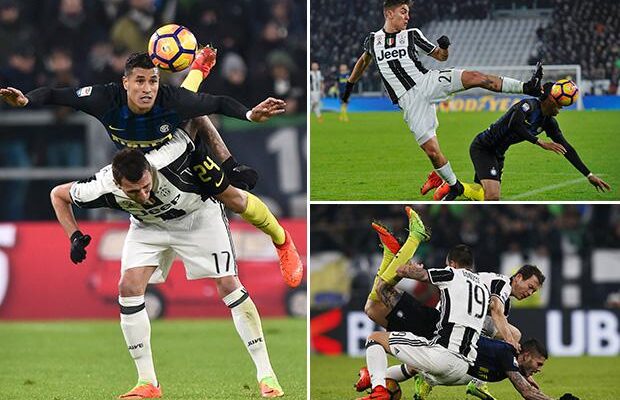In the whirlwind aftermath of a pulsating 4-3 defeat to arch-rivals Juventus, Inter Milan coach Cristian Chivu found himself in a familiar, yet increasingly frustrating, position: dissecting a loss that felt both encouraging and utterly self-inflicted. While acknowledging glimmers of brilliance and a tenacious spirit, Chivu`s post-match analysis painted a picture of a team grappling not just with tactical execution, but with a deeper, more insidious psychological burden.
The Derby d`Italia delivered all the drama one could expect from this historic fixture. Inter, twice falling behind, showcased remarkable resilience to claw their way back, eventually seizing a 3-2 lead. Hakan Calhanoglu, seemingly rejuvenated from a summer of speculation, spearheaded the comeback with a masterful brace, complemented by a sharp header from Marcus Thuram. For a significant portion of the second half, the Nerazzurri appeared to control proceedings, pinning a beleaguered Juventus deep in their own territory. But as any seasoned observer of football knows, a momentary lapse can unravel an entire narrative.
The Unraveling: A Lesson in Game Management
The final ten minutes of the encounter served as a stark, if painful, reminder of Inter`s recent frailties. Juventus, seemingly revitalized from the brink, capitalized on defensive hesitations. Khephren Thuram’s header from a free-kick leveled the score, setting the stage for Vasilije Adzic’s spectacular long-range strike in stoppage time—a goal that not only sealed Inter`s fate but underscored a critical tactical deficiency. Chivu`s comments offered a concise, almost clinical, diagnosis:
“Unfortunately, there are moments in the match, especially in the final 10 minutes, where we were lacking. We lacked sharpness and didn’t realise something different was required in the last few minutes.”
This wasn`t merely about individual errors; it was about collective game management, or the distinct lack thereof. Chivu`s subsequent remark about Juventus being “never ashamed to boot the ball into the crowd when they were in trouble” was more than an observation; it was a subtle critique of his own side`s perhaps overly aesthetic approach when pragmatism was paramount. Sometimes, the most elegant solution is simply to clear your lines with prejudice, especially when you`ve expended significant energy to turn the tide. Experience, it seems, is still a commodity Inter is struggling to fully acquire or consistently apply.
Glimmers Amidst the Gloom: Calhanoglu`s Resurgence
Despite the bitter taste of defeat, Chivu was quick to highlight the “positives.” Foremost among these was the exceptional performance of Hakan Calhanoglu. His two goals were not merely statistics; they were statements. After a period of uncertainty, Calhanoglu demonstrated precisely why he remains a pivotal figure in Inter`s midfield, offering both creative spark and crucial goals. His ability to take control and deliver under pressure was a beacon of individual quality that Chivu rightfully lauded.
“Calha did what we all expected, because this is his quality, it’s what he gives to the team. I think the performance and character of the whole team was a positive.”
Indeed, the team`s character to twice overcome a deficit speaks volumes about their fight. The issue, however, lies not in their ability to punch back, but in their capacity to maintain their guard once ahead.
The Psychological Albatross: “Cancel Out the Past”
The real crux of Chivu`s analysis, however, delved deeper than tactical missteps or individual heroics. It touched upon a more profound, almost spiritual, struggle. This defeat to Juventus marked Inter`s second consecutive Serie A loss, following a similar collapse against Udinese where they also squandered an advantage. This pattern is not accidental. The question of a “psychological frailty” looms large, particularly in the shadow of their bruising 5-0 Champions League Final loss to Paris Saint-Germain.
Chivu`s call to “cancel out what happened in the past” is not merely a motivational slogan; it`s an acknowledgment of a mental barrier that appears to inhibit the team at critical junctures. The anxiety, the pressure of expectation, and the ghost of past disappointments seem to materialize when games hang in the balance. It’s a phenomenon not uncommon in elite sports, where past traumas can unconsciously influence present decision-making, turning confident strides into hesitant steps.
For Inter Milan, the path forward requires more than just tactical adjustments or individual brilliance. It demands a collective mental fortitude, a decisive break from the narrative of self-sabotage. The effort and commitment are undeniably there, as Chivu attested, “I cannot complain about how hard the team is working, that is for sure.” Yet, hard work alone cannot dispel the specter of anxiety that appears to descend in crucial moments. The challenge for Chivu and his squad is to transform this hard work into sustained calm and unwavering focus, ensuring that the positive elements he observes can translate into tangible results, finally erasing the bitter echoes of the past.








